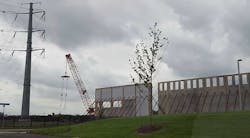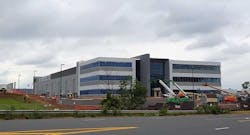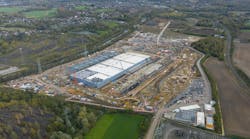TYSONS CORNER, Va. – Northern Virginia is the crossroads of the cloud, hosting the world’s largest concentration of data centers. After two straight years of record growth, the Northern Virginia market has somehow found an even higher gear, with 2018 shaping up as its biggest year yet.
The region is seeing unprecedented activity in both leasing and new construction, according to panelists at the Bisnow Data Center Investment Conference and Expo East held Thursday at the Hilton McLean Tysons Center. Access to Loudoun County’s “Data Center Alley” has become a strategic priority for the major players in cloud computing, prompting data center providers to lock down land for expansion.
“It’s like the perfect storm,” said Buddy Rizer, Executive Director for Economic Development in Loudoun County. “The pace of building is just amazing.”
Developers leased 113 megawatts of data center space in Northern Virginia in 2016, and a record 115 megawatts in 2017. Market watchers in Northern Virginia say that record could be history by the halfway point of 2018, with several leases of 25-plus megawatts in the books, and a handful of others reportedly in the works.
A number of key business drivers have aligned in Northern Virginia, including new customers and new providers entering the market, a dwindling supply of premium development sites, and the rising cost of land. As the concentration of cloud capacity in the region reaches critical mass (especially for Amazon Web Services) space in Ashburn has become the table stakes for companies with serious ambitions in cloud computing.
Some trends in the Northern Virginia market are being accelerated by FOMO – the fear of missing out. The future of cloud capacity in the region is being shaped by land deals and leasing negotiations that are happening now. As the appetite for data center space remains high, both users and developers are looking to play a longer game.
“Companies have bought land thinking it would give them five or six years of runway, and it winds up being used up in two to three years,” said Rizer. “Even though the price of entry has increased in our market, we’re seeing new entries. People still need and want to be here.”
It remains to be seen how long the current round of “land banking” will satisfy the appetite for data center property. But Rizer noted that these campuses will be built over time, supporting new data center deployments well beyond 2018.
“If just the land that has already been bought for data center use is developed, we will see at least 100 megawatts (of absorption) a year through 2022,” he said.
The Land of 100 Data Centers
Ashburn is the Internet’s boom town. It sits atop the world’s densest intersection of fiber networks, making it an ideal location to store and distribute data. It is unique in its connectivity, and access to Data Center Alley has created a building boom across Northern Virginia, creating a powerful network effect in which each new connection adds to the value of its digital ecosystem. Between Loudoun, Prince William and Fairfax counties, the region is home to nearly 100 data centers and more than 10 million square feet of data center space.
Demand in Northern Virginia is coming from the traditional hyperscale providers (Facebook, Amazon, Google, Microsoft and Apple), who have now been joined by major Chinese cloud companies, who are said to be actively seeking space in Data Center Alley. In early 2018 there has also been a surge in demand from second-tier hyperscale players like Salesforce, Uber, Dropbox and Lyft, who are all seeking larger chunks of space than in the past.
Enterprise users have smaller requirements, but are also busy in the Ashburn market, including many who want low-latency access to infrastructure operated by Amazon Web Services or Facebook. Wholesale data center operators report no shortage of interest in 2 to 4 megawatt requirements.
“It’s all happening at the same time,” said Jim Leach, Vice President of Marketing at RagingWire Data Centers. “It’s a virtuous cycle.”
Jim Leach of RagingWire make a point during last week’s BisNow Data Center Investment Conference in Tysons Corener, Va. Listening on are Loudoun County’s Buddy Rizer, and Rob Rockwood of Sabey Data Centers. (Photo: Rich Miller)
Customers are seeking to buy cloud capacity in larger increments, prompting developers to take new approaches to planning for future capacity. They are buying more land, and using hybrid lease strategies that enable cloud builders to reserve expansion space in strategic markets, while deploying capital on a pay-as-you-go-basis. This approach was used in a 36-megawatt Digital Realty lease in Ashburn, as well as a 24-megawatt build-to-suit project by QTS Data Centers in Manassas.
Prior to 2016, it was rare to see a wholesale data center lease exceeding 10 megawatts of capacity. This year, a handful of tenants are seeking 25 megawatts or more.
“What we’re seeing for the first time is that enterprises want control of their destiny,” said Allen Tucker, Managing Director at Jones Lang LaSalle. “It’s about certainty and predictability. They want a reservation, or at least a right of first offer on additional space. The demand has actually accelerated through this reservation system. We’re not seeing that in any other market.”
“I think a lot of these companies are taking down more land and looking beyond the first 30 megawatts to their next data center requirement,” said Jeremy Myers, Director of Real Estate at EdgeCore. “You’re seeing more of a land grab because of the way data center users’ needs have grown so radically.”
Sabey Announces New Data Center Construction
Data center developers are moving to meet that demand, including active development by existing players and a flurry of new providers. Today Sabey Data Centers announced that it is starting construction on its second data center building at its Intergate.Ashburn campus. The two-story Building B will deliver 22 megawatts of mission critical power and 160,000 square feet of data hall space, and be completed by the end of 2018 or early 2019.
“By commencing our second building now, we take construction risk off the table for our customers looking for near term delivery,” said Rob Rockwood, President of Sabey Data Centers.
The list of companies with data center space in development in Northern Virginia includes Digital Realty, RagingWire Data Centers, Amazon Web Services, CoreSite, CyrusOne and Infomart.
Recent market entrants include Chirisa Tech Centers (which last week announced a new Ashburn project), QTS Data Centers, Vantage Data Centers, Northstar Commercial Partners and CloudHQ, which has a major campus in Manassas and says it has site approval for a future campus in Ashburn.
The strong demand for land for future data centers has been reflected in recent purchases. QTS paid $36 million for a 28-acre campus off Lockridge Road known as West Dulles Station, or about $1.28 million per acre. That’s more than the previous record transaction of $1 million per acre for an Equinix purchase earlier this year. There are reports of pending transactions that could fetch a higher price when they close.
The new QTS Data Centers facility in Ashburn is nearing completion. (Photo: Rich Miller)
“This is a hot market,” said Meyers of EdgeCore, a new wholesale data center provider which currently has no presence in Northern Virginia. “All the low-hanging fruit has been picked long ago. If you look at land only from a dollars-per-acre perspective, it might slow you down. If you need to focus on speed-to-market, you might pay a little more.”
Land: They’re Not Making More of It
Last year Loudoun County identified 43 new potential data center sites in response to the development boom, and Rizer says that finding development opportunities is critical to data center growth in the region.
“Land is part of my concern,” said Rizer. “The biggest land grab in Loudoun County hasn’t happened yet, but it will happen soon.” Rizer said he sees the corridor along Route 50 in southern Loudoun as a particularly promising area for future data center development.
Data center providers in expansion mode say they are mindful of the cost of land in Data Center Alley.
“As the land costs go up in this area, land suddenly becomes 10 to 25 percent of your build cost,” said Brian Doricko, Vice President for Strategic Accounts at CyrusOne. “Now land is over $1 million an acre. That’s eventually going to help other markets.”
“For ‘destination market’ customers, who can go wherever they want, Virginia has to be able to compete,” said Rockwood of Sabey Data Centers.
Rockwood also sounded a note of caution about the amount of investor money flowing into the data center sector. “If there’s a concern, it’s the great influx of capital, which has been extraordinary,” said Rockwood. “That’s concerning if you believe demand is static.”
Most panelists at the BisNow event believe demand for data storage and processing is not static but will continue to grow, driven by new technologies like the Internet of Things and artificial intelligence.
“I’ve been in this market a long time, and I’ve never seen anything like this,” said Ross Rebraca, the Vice President of Technology at construction firm HITT. “We’re in the third or fourth inning of a nine-inning ballgame.”
About the Author





